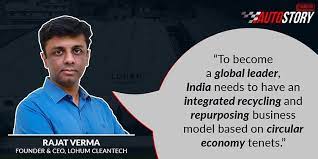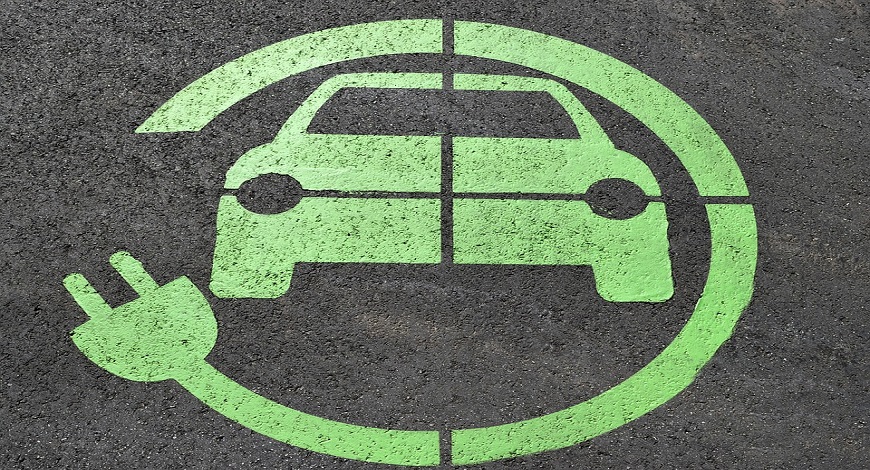
Ever since the electrification wave has hit the automotive industry, one question has been on many people’s minds – what would happen to old EV batteries? India’s LOHUM Cleantech gives a new lease of life to used EV batteries through its reuse technology, making battery materials last forever through Lithium-ion battery recycling.
Auto Futures recently caught up with Rajat Verma, Founder and CEO, LOHUM Cleantech.
“If we only trade one problem for another then we have failed. Our view is that with the right technology we could make battery materials last forever in one form or another and, in doing so, drastically reduce costs and the environmental impact. So that’s what we set out to do. That’s how Lohum was founded in 2018, as the only integrated lithium-ion battery manufacturer and recycler to lower costs of electrification both economically and environmentally,” says Verma.
The Noida-based company currently focuses on five key areas – depletion of critical battery metals, rising battery waste, geo-disparity of battery raw materials, lack of a reverse logistics ecosystem and lack of transparency in refining & recycling.
“We host in-house battery material manufacturing, reuse, and recycling capabilities to maximise closed-loop sustainability as an integrated LIB lifecycle management company,” says Verma. “Technology is in the DNA of our organisation. We’ve invested a lot of effort into developing our recycling processes & repurposing processes, and we’ve got NABL (National Accreditation Board for Testing and Calibration Laboratories India) accredited labs within the company which can test all kinds of materials that come to us.
Its three key verticals are powered by proprietary material recycling technology – reuse/second-life for e-mobility and stationary applications, and cell testing technology to maximise used battery life.
“We have an exhaustively traceable system that we’ve built from our customers’ perspective. We offer them end to end traceability, and barcode at source whatever material we receive, which is then used to track every lot all the way,” he explains.
LOHUM’s integrated approach allows it to serve as a one-stop shop for all Li-ion battery raw material, with best-in-industry overall salvage values. The company’s patented ‘Metelec’ Lithium-ion battery recycling technology has been perfected over time to yield top quality materials, produce zero waste and be highly scalable while incurring low financial and environmental expenses.
In fact, LOHUM’s entire equipment, design, and all its process flows have been developed in-house. The company boasts of full material recovery of sulphates, carbonates and sometimes metals directly.
On the reuse front, the company’s second-life battery reuse technology allows it to recirculate LIB cells for use in both EVs and stationary energy applications. This technology also helps quickly provide a buyback price at the point of sale, decides optimal second life applications, and derives the maximum possible value from a battery over its lifecycle.
“We have a fully digitised system through which we can provide near real-time prices for any battery at any stage of its life,” says Verma.
“For LIB repurposing, we have developed algorithms and heuristics to accurately estimate the remaining useful life of batteries. We use a combination of empirical, physics based, and machine learning based models for the extraordinary accuracy in RUL estimation. This helps us provide the best possible salvage value for batteries.”
India Needs a Cost-Effective Lithium-ion Battery Supply Chain
LOHUM has also forayed into material extraction from batteries.
When asked about it, Verma says: “Even as economies strive to upscale production and tackle battery waste, the core issue remains the concentration of natural rare-earth element reserves and refining capacities in a few resource-rich nations, lending geo-economic advantage to a select few.
“Every nation needs to develop self-reliance in energy storage, and domestic battery manufacturing can be powered up by fostering a robust circular-economy of battery raw materials. India’s rapidly increasing e-mobility adoption will need a steady supply of LIBs if the EV industry is to proliferate automobile markets. India needs a LIB supply chain that is not only cost-effective but also ecologically sustainable and independent of any geographic monopoly, and that is what we provide,” he notes.
All of LOHUM’s facilities are located in Greater Noida, where it has three units – recycling, battery assembly, and dismantling and testing. Currently, its facilities can handle up to 10,000 MT of battery scrap every year. Over the last three years, LOHUM has created the technology and infrastructure to recycle and refine 2 GWh, and reuse 300 MWh of battery capacity annually.
Given the modular nature of its facilities, LOHUM is now in a unique position to expand with a hub and spoke model across the globe. It is currently in the process of establishing its first spoke outside India in the US, with plans to set up another spoke in the EU within the next two years. Spokes are also being set up in southern as well as western India.
Making Transparent Recycing The Norm
One of the company’s recent milestones was entering into an agreement with Glencore, one of the world’s largest globally diversified natural resource companies, for the supply of specialty chemicals this September.
“This strategic partnership was formed to advance circularity in the Li-ion battery supply chain. Under the alliance, Lohum will supply Glencore with 10,000 MT of specialty chemicals for the battery supply chain over the next five years, including cathodes, sulphates, carbonates, and oxides of various metals extracted from spent batteries.
“This global partnership will allow both companies to deepen recycling expertise and support the advancement of a circular economy by supplying raw materials back into the battery supply chain,” he says.
As our conversation drew to a close, Verma shared his outlook on the battery recycling sector.
“Our view is that with the right technology we can make battery materials 100% sustainable, and in doing so, drastically reduce costs and the environmental impact. Today, the carbon footprint of producing a Li-ion battery can be as high as 200 Kg CO2e per KWh of capacity. That can really dent the credibility of the battery ecosystem.”
“It is imperative that transparent recycling and reuse be made the norm, and with growing focus on battery lifecycle management from both Government and corporate sectors, we seem to be on our way,” he concludes.

Forbes India
Rajat Verma already recovers raw materials from used cells at his venture, LOHUM Cleantech. He wants to close the loop by making cells in India as well.

YOURSTORY
In an interaction with AutoStory, Rajat Verma, Founder and CEO of LOHUM Cleantech, speaks about building his company, and about battery manufacturing and repurposing as an industry.

Business World Disrupt
Recognized as ‘The Most Innovative Company of the year 2022’ by The Confederation of Indian Industry (CII), LOHUM is a producer of sustainable Li-ion battery raw materials
1800 572 8822
Email : enquiry@lohum.com
G98, Site, 5, Kasna, Block A, Surajpur Site V, Greater Noida, Uttar Pradesh 201306
LOHUM Cleantech Private Limited, Plot No. D-7 & 8, Site 5th, Kasna Industrial Area, Greater Noida, Gautam Budh Nagar, Uttar Pradesh – 201308
LOHUM Cleantech Private Limited, Plot No. O-17, Site 5th, Kasna Industrial Area, Greater Noida, Gautam Budh Nagar, Uttar Pradesh – 201308